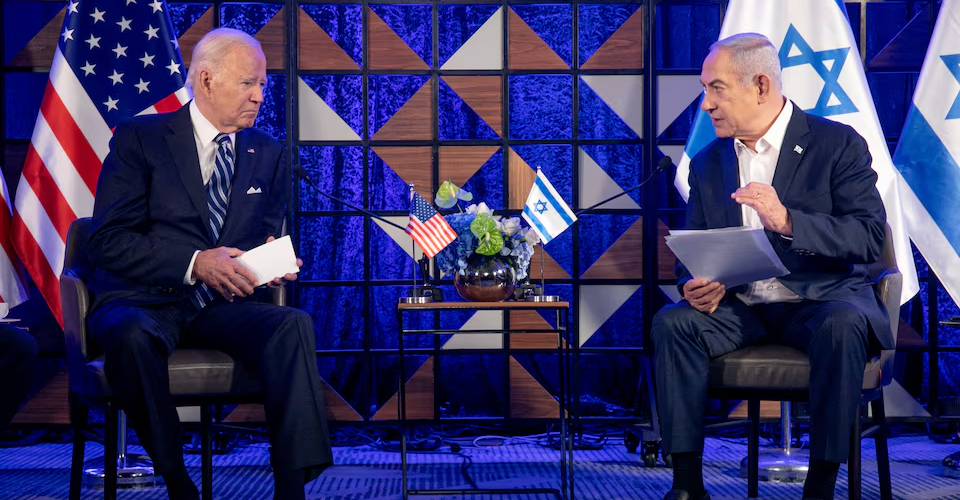
President Biden and Israeli Prime Minister Benjamin Netanyahu at a meeting in Oct. 2023. (Courtesy/Reuters).
As the anniversary of Hamas’s Oct. 7 attack on Israel approaches, over 60% of Americans say that the U.S. should facilitate a diplomatic resolution to the ongoing Israel-Hamas War, according to Pew Research Center.
Oct. 7, along with Israel’s subsequent assault on Gaza, signified a pivotal moment in global perception of the Israel-Palestine conflict, fueling widespread protest and a declaration by the International Court of Justice asserting that Israel’s occupation of Palestinian territory is illegal.
Now, escalations between Israel, Iran and Lebanon’s Hezbollah, have left the region on the verge of regional war.
The conflict in the Middle East has become a critical U.S. foreign policy issue. So, as the 2024 Presidential Election looms and tensions in the region continue to rise, what role will the United States play in this pending war?
What is the United State’s relationship with Israel?
The United States and Israel have a long-standing allyship. The U.S. was the first nation to recognize Israel as an independent state in 1948, and diplomatic relations were established the following year.
Since then, Israel has become America’s closest partner in the Middle East.
The two are “bound closely by historic and cultural ties as well as by mutual interests,” according to the U.S. Embassy in Israel.
According to the Council on Foreign Relations, Israel is, cumulatively, the largest recipient of U.S. foreign aid, receiving a total of $310 billion since it was founded.
Since the start of Israel’s current war on Gaza, the United States has provided at least $12.5 billion in aid to Israeli military forces. About a third of this aid was given under the Foreign Military Financing Program, which mandates that Israel use this money to purchase U.S. military equipment and services.
What have U.S. government officials said about the Israel-Palestine conflict over the past year?
October
Oct. 9: Days after Hamas’s air strike on Israel, the U.S. released a joint statement, alongside France, Germany, Italy and the UK, expressing their staunch support for Israel and their condemnation of Hamas.
Oct. 18: After the Pentagon deployed two aircraft carriers to the eastern Mediterranean, the United States vetoed a UN Security Council proposal that would have called for “humanitarian pauses” in fighting to deliver lifesaving aid to Palestinians in Gaza.
US Ambassador Linda Thomas-Greenfield was the only council member to vote against the resolution.
“This resolution did not mention Israel’s right of self-defense,” she said.

President Biden at a press conference on the Oct. 7 attacks. (Courtesy/US Embassy).
Oct 25: President Biden questioned Palestine’s reported death toll in the Gaza Strip.
“I have no notion that the Palestinians are telling the truth about how many people are killed. I’m sure innocents have been killed, and it’s the price of waging a war,” he said.
November
Nov 3: Secretary of State Anthony Blinken urged Israel to pause its military action against Gaza to allow humanitarian aid into the strip.
Nov 15: The U.S. abstained from a UN Security Council Resolution calling for the release of all hostages held by Hamas and “urgent and extended humanitarian pauses and corridors through the Gaza Strip to facilitate the provision of essential goods and services.”
Nov 21: President Biden voiced his support for a four-day pause in fighting to allow for the release of Israeli hostages.
December
Dec 8: The State Department bypassed Congress to send nearly 14,000 tank shells to Israel.
Dec 12: Biden criticized Israel for its failure to protect civilians from what were said to be targeted attacks against Hamas.
“They’re starting to lose that support by the indiscriminate bombing that takes place,” he said.
Dec 22: The U.S. abstained from a UN Security Council resolution demanding the safe delivery of humanitarian aid to Palestinians throughout Gaza.
January
Jan 11: Biden authorized military attacks against Yemen’s Houthi Rebels after they commercial cargo ships in the Red Sea in an act of resistance against Israel’s blockade of Gaza.
“These attacks have endangered U.S. personnel, civilian mariners, and our partners, jeopardized trade, and threatened freedom of navigation,” Biden said.
February
Feb 8: Biden criticized the intensity of Israel’s military offensive on Gaza.
“I’m of the view, as you know, that the conduct of the response in Gaza Strip has been over the top,” he said.
Feb 15: The White House discouraged Israel from attacking the densely populated city of Rafah without a plan to keep civilians safe.

United Nations Security Council. (Courtesy/Council on Foreign Relations).
Feb 20: The United States vetoed a UN Security Council Resolution demanding an immediate ceasefire in Gaza.
Feb 26: President Biden expressed his support for a ceasefire to pause fighting during the Muslim holiday Ramadan.
March
March 2: Vice President Harris called for an immediate temporary ceasefire between Israel and Hamas to allow for a hostage deal.
May
In May, Israel began ground operations in Rafah city.
Biden told CNN: “I have made it clear to Bibi [Netanyahu] and the war cabinet they’re not going to get our support if, in fact, they’re going into these population centers.”
The Biden administration temporarily paused the shipment of about 3,500 bombs to Israel after it threatened to lead a full-scale assault on Rafah.
May 13: National Security Advisor Jake Sullivan said, “If Israel’s military efforts are not accompanied by a political plan for the future of Gaza and the Palestinian people, the terrorists will keep coming back and Israel will remain under threat.”
July
In July, Israel led a series of operations against militant groups in the occupied West Bank.
July 30: The White House reaffirmed its backing of Israel against its regional neighbors.
“Our support for Israel’s security is ironclad and it’s unwavering, especially as it defends itself against Iran-backed threats, including threats from Hizballah,” said Vedant Patel, principal deputy spokesperson at the Department of State. “No nation could be expected to tolerate the kinds of threats that Israel is facing and continues to face.”
August
August 2: In response to Iran and Iran-backed groups, Sabrina Singh, Deputy Pentagon Press Secretary said, “More defensive military capabilities will deploy to the Middle East to bolster force protection for U.S. troops in the region and to defend Israel.”
August 14: In a press briefing, Patel advocated for a ceasefire while also reaffirming the strength of the United States’s allyship with Israel.
“We are continuing to work to secure a ceasefire deal that would bring home all the hostages, that would help alleviate the suffering in Gaza; that certainly continues to be a priority for us,” he said. “We have a longstanding military and security partnership with the Government of Israel. We recognize that Israel has a right to defend itself from terrorism and security threats.”
August 22: Kamala Harris reaffirmed her support for Israel.
“I will always stand up for Israel’s right to defend itself. And I will always ensure Israel has the ability to defend itself because the people of Israel must never again face the horror that a terrorist organization called Hamas caused on October 7,” she said. “At the same time, what has happened in Gaza over the past 10 months is devastating. So many innocent lives lost, desperate, hungry people fleeing for safety over and over again. The scale of suffering is heartbreaking.”
September
Sept 30: In response to Israel’s airstrikes on residential buildings in Lebanon, Department of State spokesperson Matthew Miller said, “It’s important to understand why Israel is defending itself against these attacks. It’s because Hizballah started a war, started a conflict with Israel on October 8th. Had nothing to do with Gaza, nothing at all to do with Gaza. They started the conflict, and Israel has a right to defend itself against that terrorism.”
October
Oct 1: The U.S. condemned Iran’s missile attacks on Israel.
“We condemn these reckless attacks by Iran, and we call on Iran to halt any further attacks, including from its proxy forces,” said Pentagon Press Secretary Air Force Maj. Gen. Pat Ryder. “During the attack, the U.S. military coordinated closely with the Israeli Defense Forces to help defend Israel.”
Although U.S. government officials have occasionally voiced disapproval of Israel’s military aggression, policy on Israel has remained overwhelmingly supportive.










Recent Comments